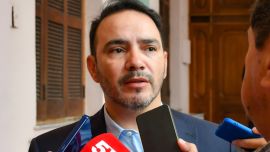Javier Milei finds himself up against the clock just four months into his term as Argentina’s president.
Since taking the reins in December, he has cut federal aid for local governments, devalued the peso, announced plans to terminate 70,000 state jobs and done away with price controls. But for all the economic pain that his “shock therapy” has unleashed on Argentines — annual inflation has soared to 276 percent — voter support is little changed from when he ascended to office.
Now, Milei, who won with 56 percent of the vote in November, is in a race against time to bring inflation back down and hold on to that popularity.
“I’m worried that if he takes too long to lower inflation, and the recession and the job losses along the way are too harsh, the government will start to lose that,” said Guido Sandleris, the president of Fundación Ecosur, professor at Johns Hopkins University and Central Bank governor under former president Mauricio Macri.
Hurdles abound. Soy, Argentina’s top export, is selling at lower prices than expected, jeopardising Milei’s hopes for a swift economic turnaround. And the opposition-led Congress, where his party holds only about 15 percent of seats, could curtail his post-victory honeymoon.
The lower house Chamber of Deputies has already picked apart a version of his sweeping ‘omnibus’ bill that sought to radically remake the government, even after the legislation had been stripped of its most controversial measures, including tax hikes and the privatisation of state oil company YPF.
For now, Milei is still coasting. His approval rating is 49 percent, only a three-point slip since December, according to top polling firm Isonomía. The country’s sovereign bonds are the best performing among emerging markets so far this year after Ecuador, according to a Bloomberg index.
Alejandra González, 39, a gas-station janitor in Morón, a working-class municipality just outside Buenos Aires, had long supported left-wing Peronist candidates or sat out elections altogether. But she voted for Milei because he represented a change, she said.
A single mother of five with a three-year-old granddaughter, Gonzalez said her US$250 monthly salary wasn’t enough to feed her family, forcing her to turn to food banks. With things so bad for so long, she’s willing to grit her teeth and hope for something better.
“I already know what it’s like to be at rock bottom,” she said. “Now I’m waiting to see what else he can give us. We have to be patient.”
Unprecedented phenomenon
Despite half of Argentines saying they struggle to make ends meet each month, around a third of that group still supports the president. Juan Germano, the director of Isonomía, called this an “unprecedented” phenomenon.
“Milei’s voters understand the present is bad, but they are very convinced about the future,” he said.
Many bond traders echo that confidence.
Dollar bonds due in 2030 are trading at some 52 cents on the dollar, levels not seen since the notes were issued in a September 2020 debt restructuring. The debt, which has handed holders a return of roughly 13 percent since then, has rebounded as Milei took office after months of intense volatility surrounding the libertarian’s emergence in last year’s vote.
“Debt performance means investors are giving Milei the benefit of the doubt,” said Luca Sibani, a Milan-based money manager at Epsilon SGR.
Markets have grown less worried Argentina will default in July, when it has US$1.7-billion due on hard currency bonds issued under New York law. A local risk barometer is also approaching its lowest level in roughly three years, a signal to some money managers that it might be time to buy into the buzz.
“More investors are at least willing to test the waters,” said Mauro Roca, a managing director at the Los Angeles-based TCW Group.
While Milei’s economic reforms started strong, it’s all relative: he inherited an economy in tatters. For average Argentines, the trauma of hyperinflation still looms large.
Fernando Savore, the owner of a grocery store in Morón, has taken to breaking up one-kilo blocks of sugar into smaller packs and selling them at half the price. Otherwise his customers couldn’t afford sugar thanks to raging inflation, he said.
“Any Argentine knows what happens when you churn the money-printing machine because you would watch that 1,000-peso bill, with the same shape and colour, buy less things every time,” he said. “We know that didn’t work. So why not hold up hope?”
Roadblocks
Yet things could go awry — and fast.
As the peso has stabilised, monthly inflation has slowed in recent months from a December peak of 26 percent percent. But analysts expect progress to stall as students return to school, unions negotiate wage hikes and the state strips subsidies that could eventually lead to some energy bills skyrocketing by as much as 700 percent.
Diego Ferro, founder of M2M Capital in New York and a sceptic on Argentina bonds, said Milei wants to do the right thing, but “between trying and accomplishing it, there is a big difference.”
“The core of Milei’s economic revamp is downsizing the state — in terms of both public expenditure and regulations. The longer it takes for Milei to negotiate it with Congress, the higher the risk that he needs to devalue the currency again, way before he has any chances of lifting currency controls. That would send a new inflationary wave into what is already a rather fragile economy, and could erode his popular support — and his ability to deliver on his plans,” said Adriana Dupita, a Bloomberg economist for Brazil and Argentina.
The weather gods may also scuttle Milei’s plans. While Argentina’s soy harvest is expected to be bountiful this year, low international prices could limit its export windfall.
“There’s a big question-mark around what will happen in the next harvest, which means the government has no political power to spare,” said Ignacio Garciarena, a former agriculture official under Macri.
In Buenos Aires, Congress has halted progress on Milei’s two biggest initiatives: the omnibus bill, which sought to expand executive powers, slash spending and reform the political system, along with a decree that deregulated vast swathes of the economy.
Milei got word of the lower house’s evisceration of the omnibus, the centrepiece of his shock therapy agenda, while on a trip to Israel. From there, he ordered his top advisor to kill the legislation and took to X to launch a tirade against the lawmakers who defied him, branding them “beasts” and “traitors.”
Following a spat between Milei and Argentina’s provincial governors over a local-funding shortfall, in March a coalition of Peronists and moderates from the south overturned his executive decree in the senate. It now awaits its fate in the lower house.
Milei has invited Argentina’s governors and the mayor of Buenos Aires City to sign an agreement by May 25 that will offer them some fiscal relief in exchange for backing his ambitious reforms in Congress.
After meeting members of Milei’s Cabinet on March 18, Margarita Stolbizer, a moderate congresswoman of the sort that Milei must court, said his government has, finally, begun listening to the other side.
“The problem is how long that actually lasts and if it coincides with the president’s strategy,” she said. “Or if tonight, the president will take to Twitter and insult us again.”
related news
by Manuela Tobias & Kevin Simauchi, Bloomberg






















Comments